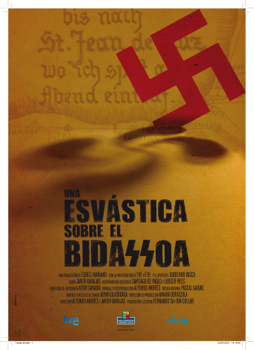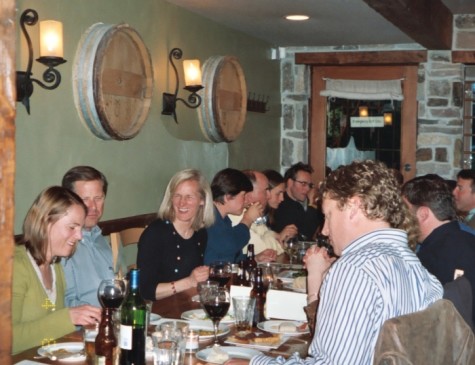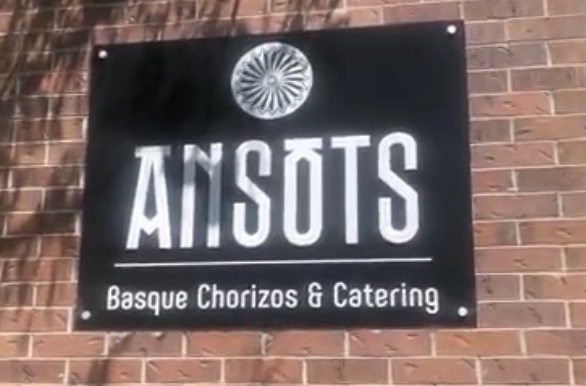‘Basque Swastika’ part of Basque Film Series in SF

The film “Basque Swastika” looks at the NAZI occupation of the Basque Country. Photo: San Sebastian Film Festival.
February 1, 2015
A World War 11 documentary that premiered at the 2013 San Sebastian Film Festival explores the interest of top Nazi officials in the unique Basque culture and its mysterious origins. The film, “Basque Swastika,” will be shown at the Basque Cultural Center on Friday, March 6.
“The Basque Swastika” relies on rare archival footage, historic documents and eyewitness accounts to feature an interesting look at Basque resistance and cooperation with the Nazi occupiers.
The film is part of the San Francisco Basque Film Series, which also includes “Jostunak” on April 10 and “Señales de Vida” on May 1. The films are shown at the Basque Cultural Center at 7:30 p.m. and are free. The center is located at 599 Railroad Ave. in South San Francisco.
RELATED EUSKAL KAZETA REPORTS:
Basque films at San Sebastian Film Festival
Basque filmmaker Features Bertsolaritza
International Film Festival in San Sebastian
The 80-minute film was directed by Alfonso Andrés, whose career began at Teledonostia and has worked on several film projects, and Javier Barajas. Barajas has written screenplays for documentaries including “Los Vascos y la Segunda Guerra Mundial” and “La Joya del Cantábrico.”
After Adolph Hitler’s military defeated France in 1940, German scouting troops arrived at the Bidasoa River near Hendaye. This paved the way for the arrival of Nazi forces that occupied parts of the Basque Country until 1944, according to the film. Among those who visited the Basque Country was Heinrich Himmler, head of the Gestapo and one of the most powerful figures in Germany.
Among the footage used by Andrés and Barajas is a short Nazi propaganda film titled ““Im lande der Basken,” or “In the Land of the Basques.” It was produced by noted German director Herbert Brieger, whose son is featured in “The Basque Swastika.”
Other compelling footage shows German planes crashing at the beach at Donostia, or San Sebastian, and Nazi soldiers enjoying rest and relaxation on the sand at Biarritz.
Even though the Basques opposed Spanish dictator Francisco Franco, who was supported by Hitler, several commentators in the documentary say that the Nazis viewed the Basques as one of Europe’s “purer” races. The Basques were neither French nor Spanish, which in the view of some Nazis meant that they were not tainted by impurities of other cultures, according to the film.
Critics who saw The Basque Swastika at the festival, such as this writer from The Hollywood Reporter, described it as eye-opening and well-received by audience members.
View the trailer for The Basque Swastika:
Originally published October 2013.


 Donate
Donate



Mike Goyette • Sep 24, 2020 at 2:22 pm
My father had to flee his birthplace of Biarritz because of the Nazis. I should say he was able to flee, because my grandfather was a US citizen, while my grandmother was French Basque through and through. They, at least, were able to leave for the duration of the war. The rest of our family was left to suffer. If you asked my late grandmother, she was Basque – period. I have many stories of family suffering under Nazi occupation, all word of mouth but I have little doubt all of it true. There was no love in my Basque family for the Nazis, that I know for sure. The details may not matter to many, but it was always a source of some anger that the Nazis used the swastika, as it had nothing to do with Germany until the 1800’s and an archeological expedition found them to be a common symbol across many cultures. To say that Germany, nay – the Nazi party hijacked a cultural icon for many peoples around the world would be oversimplification. Because of the evil the Nazis represent, the swastika has come to represent that evil – so far from it’s original meaning. Just one more tragedy — a result of an evil we must never, ever forget or let come again. If we Basque must sacrifice our heritage (clearly just one of the many travesties the Nazis brought on the world), let us at least make sure an evil like the Nazis never come to power again.
John • Jan 22, 2022 at 10:23 pm
Your family experience was different from mine. My last name originates from the Biscay province. My Basque relative served in the Carlist militia during the civil war and during World War II, he volunteered to join the Blue Division during the invasion of Russia. He served until they were withdrawn from the front. I just want to clarify I’m not a pro-Nazi, but it’s clear to me that there were Basques that were pro fascist and pro-Nazi. History is not black and white.
Beatriz Artadi Turnbull • Jun 11, 2024 at 7:59 am
My mother and her family had to flee from Mundaka to France and there were Nazis at checkpoints at the Spanish border stealing from the fleeing Basques and physically beating them. My aunt, a fantastic swimmer,swam past the checkpoint with family valuables and met family on the other side in France. The Nazis were EVIL especially with Franco aligning himself with Nazis and murdering many Basques.
Marie-Nicole LAPEYRADE • Nov 24, 2013 at 9:28 pm
How can I see it in San Francisco, CA?Pls let me know how I might procure it for the film library for the Gure Euskal Etxea in South San Francisco CA, USA
Aitor • Nov 11, 2013 at 7:45 am
More information in http://thebasqueswastika.com/
Sandra Ott • Oct 7, 2013 at 10:17 am
I am completing a book manuscript about Franco-Basque-German relations during the German occupation of Iparralde. I would be particularly keen to know how a copy of the film might be obtained by our Basque Library at the University of Nevada, Reno. Thank you for any further information about the film.
Leonard Bloom • Oct 5, 2013 at 10:38 am
Will this documentary be available here in the U.S. for viewing? Let me know if someone has the answer.
rjl • Oct 6, 2013 at 6:52 am
Leonard, we will be monitoring this and report on it if the documentary plays in the U.S. Thanks – the editors.